Rush Limbaugh’s longtime producer tributes ‘Rush on the Radio’ in new book
James Golden remembers the ‘incredible’ legacy the late radio legend left on American media on ‘Hannity.’
Talk radio icon Rush Limbaugh died one year ago, on February 17, 2021, leaving behind a massive void of his big, booming voice that articulated conservatism like nobody else in American history.
"I can’t believe it’s been a year," Sean Hannity told Fox News Digital.
"The great gift that I think Rush had is he always had a unique take on whatever the issue of the day was, that nobody else would ever think of. I can't tell you how many times he would say something and I'd be like, ‘Why wouldn't I think like that?’ He just had a gift that nobody else had," Hannity said. "You want to talk about the greatest of all time, the goat? It's definitely Rush."
PHOTOS: RUSH LIMBAUGH THROUGH THE YEARS
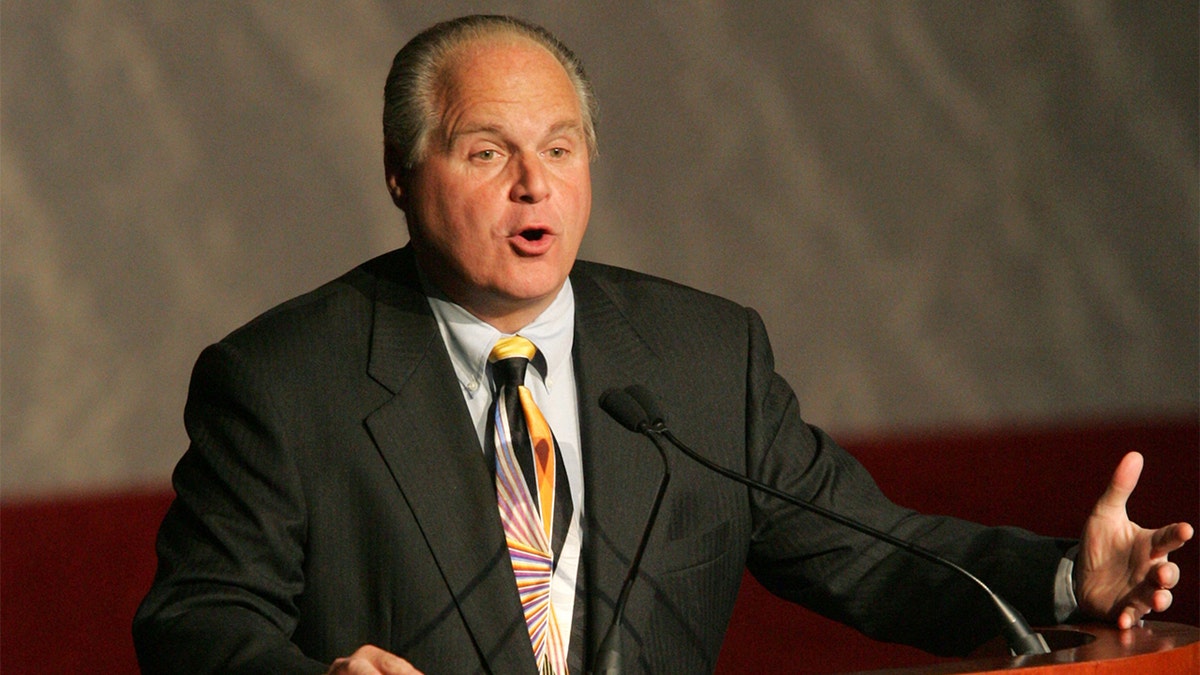
Rush Limbaugh, the monumentally influential media icon who transformed talk radio and politics in his decades behind the microphone, helping shape the modern-day Republican Party, died in 2021 at the age of 70 after a battle with lung cancer. (John Medina/WireImage)
The radio icon learned he had Stage IV lung cancer in January 2020 and was awarded the Presidential Medal of Freedom by then-President Trump at the State of the Union address days later. After receiving America’s highest civilian honor, Limbaugh continued to host his show whenever he could while undergoing brutal treatment for his advanced cancer.
Hannity said that most people would have called it a career after three-plus successful decades and cross a few things of a bucket list while enjoying their finals days – but Limbaugh didn’t operate like most people.
"Rush’s bucket list was to do what he did every day. His bucket list was to be behind that microphone. His bucket list was to be with his audience. His passion was radio and his passion was politics, and his passion was his audience," Hannity said.
"That's why he went through those treatments, just to get well enough to get back on the air for as long as he could until he had to take the next round of treatment," he added. "I think that speaks volumes and it's a life lesson for all of us that you need to love what you do in life. And obviously, he loved his audience that much."
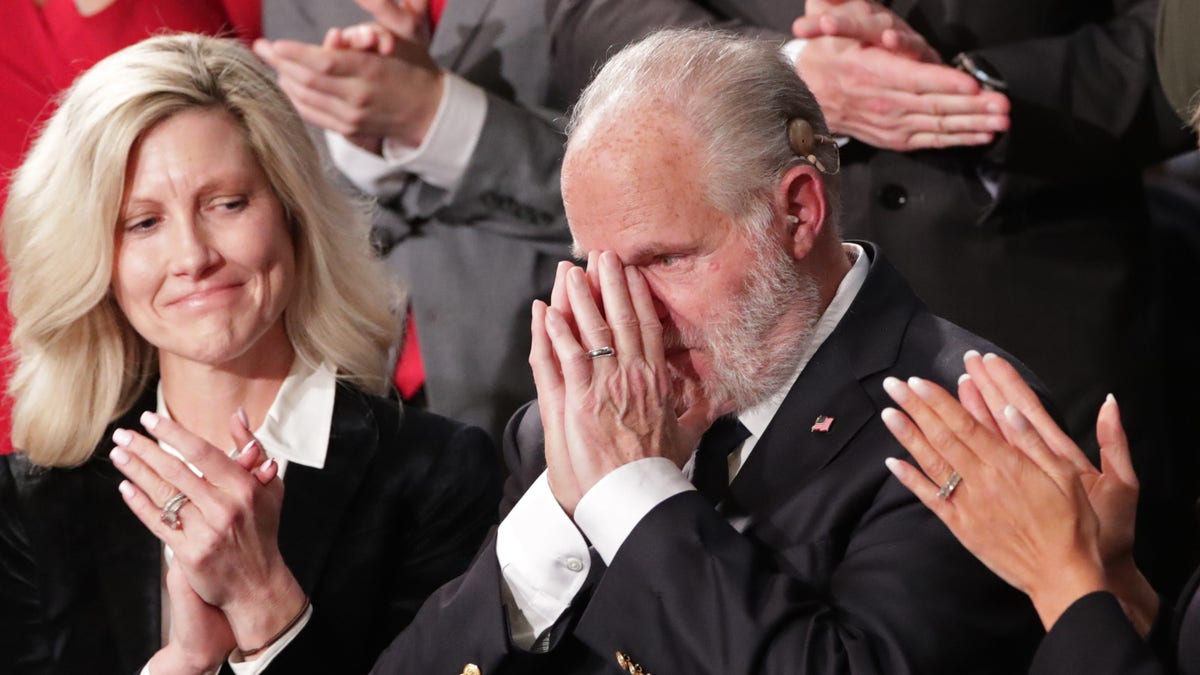
Conservative radio talk show host Rush Limbaugh reacts as he is awarded the Presidential Medal of Freedom during U.S. President Donald Trump's State of the Union address to a joint session of the U.S. Congress in the House Chamber of the U.S. Capitol in Washington, U.S. February 4, 2020. REUTERS/Jonathan Ernst
He lost his battle with lung cancer a little over a year after receiving the Presidential Medal of Freedom. Limbaugh’s death rocked everyone from his listeners to Trump, who checked in on the talk radio icon on a frequent basis.
"I know that President Trump stayed in touch with him all throughout his illness and would call him regularly," Hannity said. "He did care a lot about Rush."
CHRISTMAS WITHOUT RUSH LIMBAUGH
Limbaugh is considered one of the most influential media figures in American history and has played a consequential role in conservative politics since "The Rush Limbaugh Show" began in 1988. Perched behind his Golden EIB (Excellence in Broadcasting) Microphone, Limbaugh spent over three decades as arguably the most beloved and polarizing person in American media.
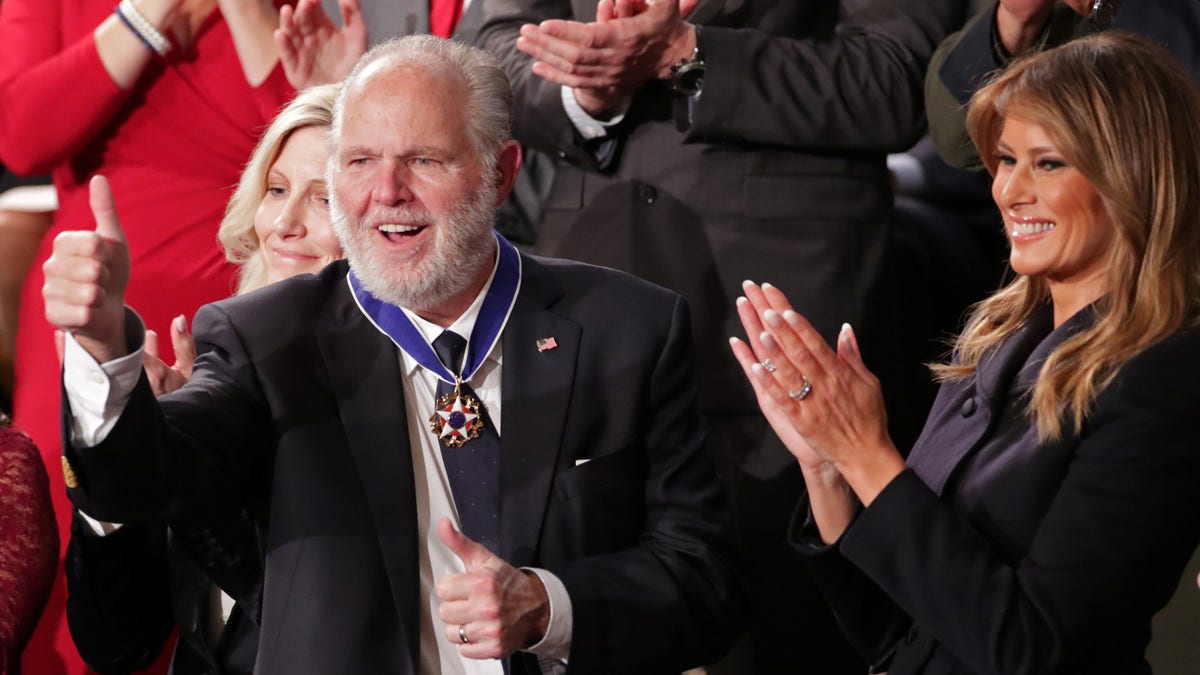
Rush Limbaugh reacts as he is awarded the Presidential Medal of Freedom by U.S. First Lady Melania Trump during U.S. President Donald Trump's State of the Union address to a joint session of the U.S. Congress in the House Chamber of the U.S. Capitol. (REUTERS/Jonathan Ernst)
The program that began 34 years ago on national syndication with only 56 radio stations grew to be the most listened-to radio show in the United States, airing on more than 600 stations. Up to 27 million people tuned in on a weekly basis and Limbaugh has lovingly referred to his passionate fan base as "Dittoheads," as they would often say "ditto" when agreeing with the iconic radio host.
In his final radio broadcast of 2020, Limbaugh thanked his listeners and supporters, revealing at the time that he had outlived his prognosis.
"I wasn't expected to be alive today," he said. "I wasn't expected to make it to October, and then to November, and then to December. And yet, here I am, and today, got some problems, but I'm feeling pretty good today."
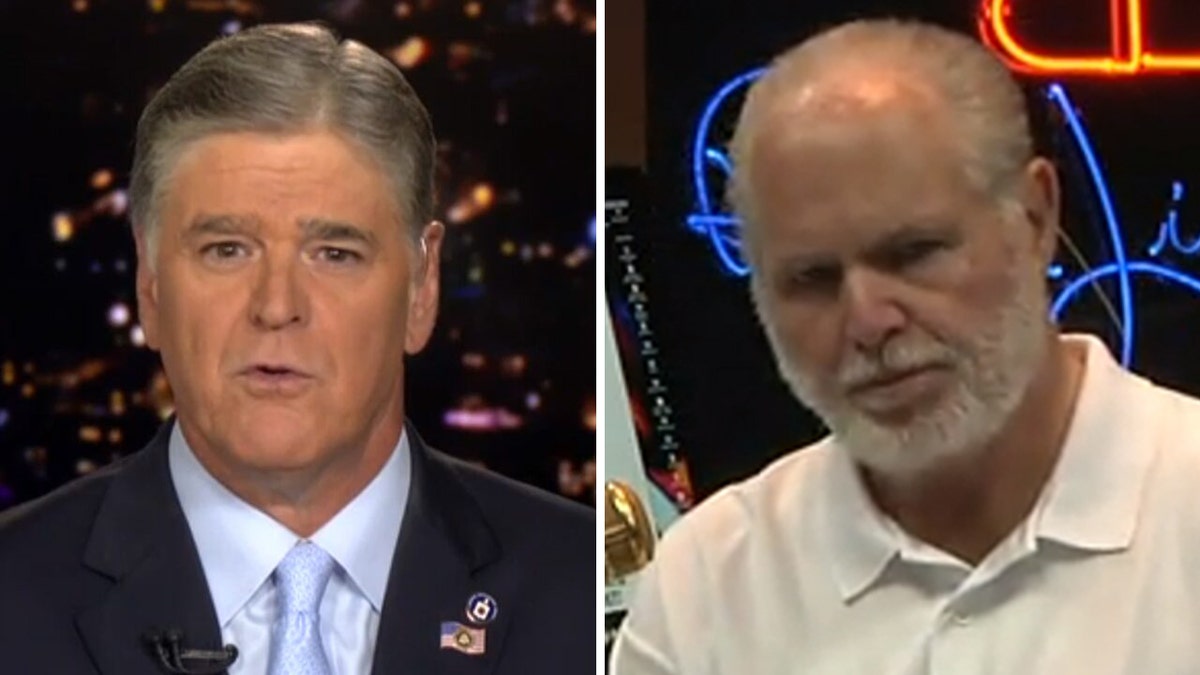
Sean Hannity said Rush Limbaugh is simply "irreplaceable."
Limbaugh helped boost Trump’s influence prior to the 2016 election simply by taking him seriously as a candidate when other established conservatives didn’t want the former reality television star anywhere near the Republican Party. Many of Limbaugh’s listeners eventually became Trump supporters and the radio legend continued to defend Trump throughout his presidency despite occasional disagreements.
In the heat of the 2020 presidential election, Limbaugh hosted Trump for what was an unprecedented two-hour "radio rally", during which the president was virtually given control of the coveted golden microphone to answer questions from the host and his listeners.
RUSH LIMBAUGH REMEMBERED BY 'BO SNERDLEY': 'INCREDIBLE HUMAN BEING' WHOSE LEGACY CONTINUES
Limbaugh, born in Cape Girardeau, Mo., on Jan. 12, 1951, began his radio career in 1967 as a "helper" when he was only 16 years old. He eventually graduated to disk jockey and worked at a small station roughly 100 miles south of St. Louis while attending high school.
"I was totally consumed," Limbaugh told the New York Times in 1990, noting that his idol was a Chicago radio host named Larry Lujack. By 1971, Limbaugh was a morning radio host in Pittsburgh but covered things such as "farm news" more often than politics. He has said he realized America was the "greatest country ever" when taking trips to Europe and Asia in his late 20s and early 30s, an experience that helped shape his political views.
From that point forward, Limbaugh believed that "American exceptionalism" shouldn’t be frowned upon, and his conservative views became more prominent.
"Rush loved this country with all of his heart, mind, body and soul," Hannity said. "He impacted a generation of Americans into what real conservatism was all about. He was a big believer in the individual and liberty and freedom and capitalism and free markets and our constitution."
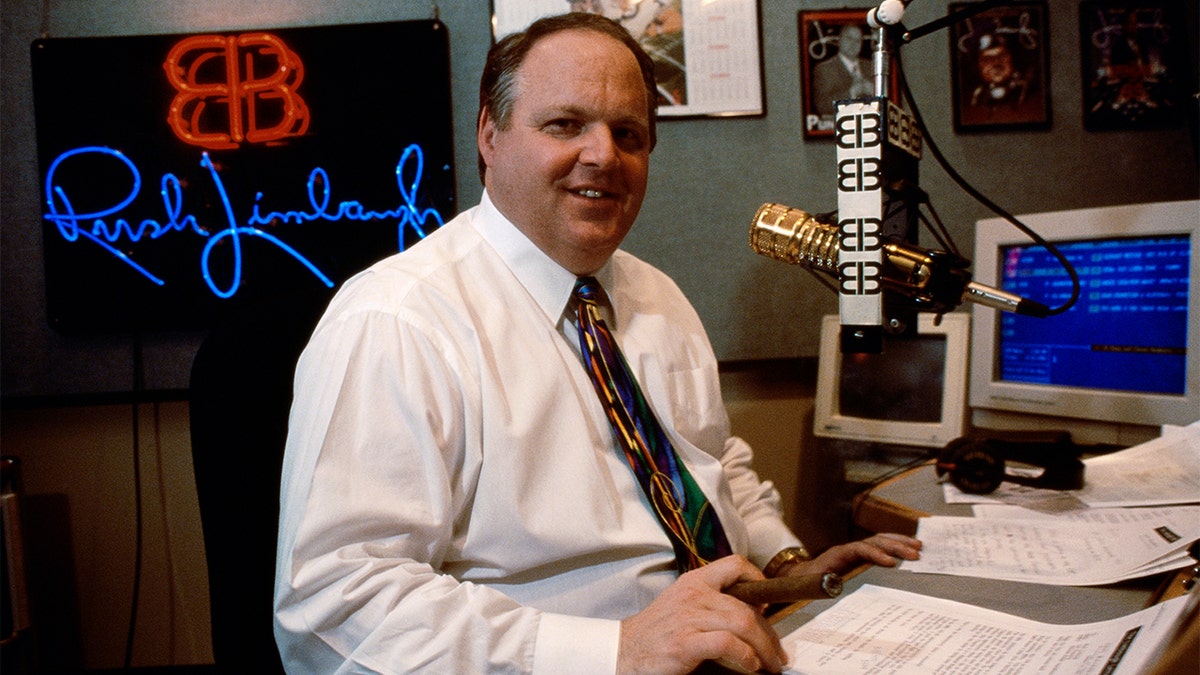
Perched behind his Golden EIB (Excellence in Broadcasting) Microphone, Rush Limbaugh spent over three decades as arguably both the most beloved and polarizing person in American media. (Photo by mark peterson/Corbis via Getty Images)
In 1987, the Federal Communications Commission repealed the Fairness Doctrine, a policy that had been in place since 1949 and mandated that both sides of controversial political issues receive equal time on radio programs. The decision by the FCC paved the way for Limbaugh to broadcast his conservative views without fear of being punished by the government, quickly leading to the now-prominent talk radio format that he pioneered.
RUSH LIMBAUGH'S MOST MEMORABLE MOMENTS; A LOOK BACK AT THE RADIO TITAN'S LEGENDARY CAREER
After local radio gigs in Pittsburgh, Kansas City, Sacramento, Limbaugh landed at WABC in New York shortly after the Fairness Doctrine was repealed. It was there that he changed talk radio forever when "The Rush Limbaugh Show" became a cultural phenomenon for both the message and the way it was delivered.
"Unlike most radio talkers, who affect a casual, intimate style, Limbaugh sounds like he's on a soapbox. He is intoxicated by words, especially those flowing from his own lips. His vocabulary is extensive; his diction tends to the grandiosely formal, though overblown to the point of self-parody. His nervous energy plays out through hands that never stop moving. They rattle the papers, slap the desk, punch the console. Whap! Whap! Whump! This muted percussion is often heard on the air, a rhythmic accompaniment to Limbaugh's voice," author Lewis Grossberger wrote in New York Times Magazine in 1990.
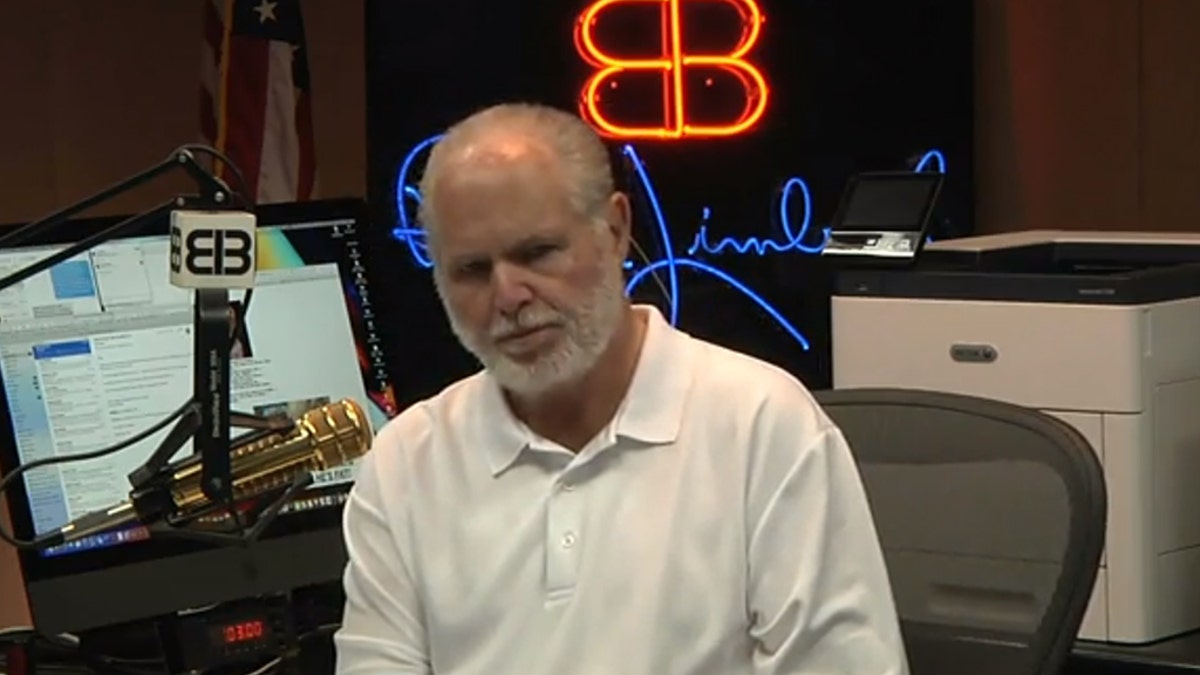
Rush Limbaugh lovingly referred to his passionate fan base as "Dittoheads," as they would often say "ditto" when agreeing with the iconic radio host.
Around that time, Hannity was in New York for "The Phil Donahue Show" and popped by ABC to chat with the program director. Limbaugh was also there and the two met for the first time.
"He couldn’t have been nicer," Hannity said.
A few years later in 1996, Hannity moved to New York to help launch Fox News and found himself broadcasting his radio show from the ABC studio where Limbaugh was housed. Hannity started out doing a late-night shift but was quickly moved to the afternoon drive timeslot that came on immediately after Limbaugh.
"I would see him from time to time when he was there, he had been making the transition down to Florida, and then they started inviting me to fill in for him," Hannity said. "The first time I filled in, I'm doing the opening monologue to his show and I'm like on 600 stations. I never get nervous doing radio, but I felt it that day."
Hannity recalls a loud "thud" sound when Limbaugh’s golden EIB microphone fell in the middle of his monologue the very first time he filled in for the iconic host. Hannity finished his monologue with his head down on the table, attempting to talk as he desperately tried to hold the mic steady.
"I’m sweating profusely, thinking, ‘I’m never getting invited back here again,’" Hannity said. "But they used me a bit to fill in for him and it was such a great opportunity, I couldn’t believe it. I’m very grateful and thankful that he helped… it certainly raised my profile a lot."
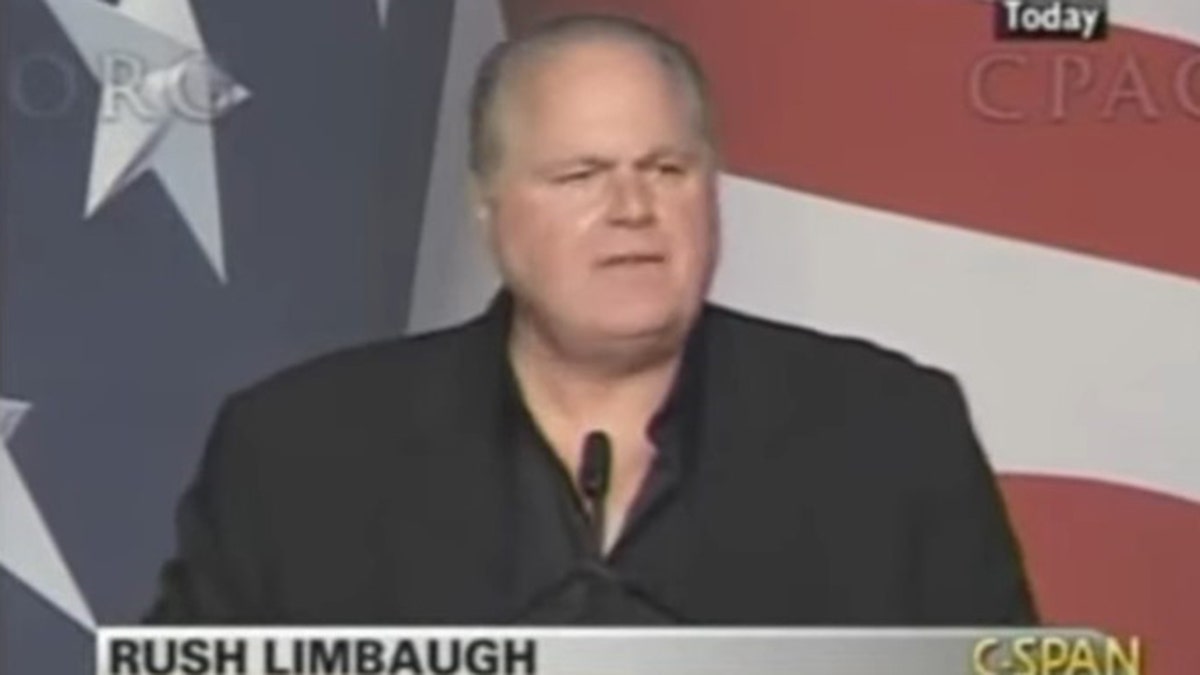
While Rush Limbaugh made his career on radio, a speech he delivered at the Conservative Political Action Conference (CPAC) in 2009 is widely considered one of the most important moments of his career. (https://www.youtube.com/watch?v=w32hFilBAUg)
Limbaugh was enshrined in the Radio Hall of Fame and the National Association of Broadcasters Hall of Fame. He was a five-time winner of the National Association of Broadcasters Marconi Award for "Excellence in Syndicated and Network Broadcasting," a No. 1 New York Times bestselling author and was named one of Barbara Walters’ 10 Most Fascinating People in 2008 and one of TIME’s 100 Most Influential People in the World in 2009.
CLICK HERE TO GET THE FOX NEWS APP
While Limbaugh made his career on radio, a speech he delivered at the Conservative Political Action Conference (CPAC) in 2009 is widely considered one of the most important moments of his career -- an explanation of "who conservatives are" that caused the crowd to erupt with chants of "USA! USA!"
Hannity said Limbaugh would want the next generation of conservatives to "keep up the fight," but the massive void he left behind is simply impossible to fill.
"Rush Limbaugh was just irreplaceable," Hannity said. "You cannot replace a guy with that much talent."
Fox News’ Charles Creitz, Yael Halon and David Rutz contributed to this report.




















